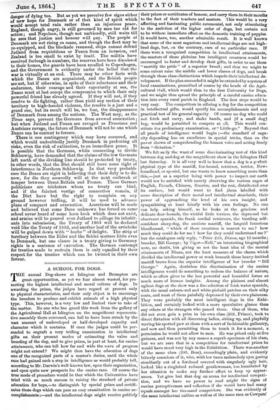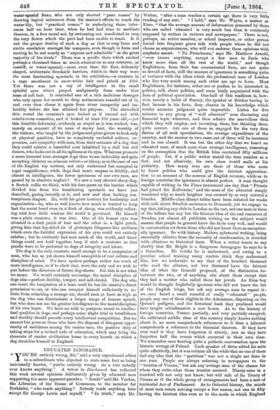A SCHOOL FOR DOGS.
THE annual Dog-shows at Islington and Brompton are great opportunities, as yet we fear almost wasted, for pro- moting the highest intellectual and moral culture of dogs. In awarding the prizes, the judges have regard at present only to physical characteristics, and their only object is to encourage the breeders to produce and exhibit animals of a high physical type. This, however, is a very low and limited view to take of the matter. No one who has gazed this week from the gallery of the Agricultural Hall at Islington on the magnificent representa- tive assembly there convened, can fail to have been struck by the vast amount of undeveloped or half-developed capacity and character which it contains. If once the judges could be per- suaded to engraft a very triffing examination in intellectual gifts on their present modes of estimating the value and breeding of the dog, and to give prizes, in part at least, for canine attainments, who can tell how far and wide the wave of progress might not extend? We might then have the education of dogs one of the recognized parts of a master's duties, until the whole race had gained such a step in intelligence as would probably tell, according to Mr. Darwin's well-known law, upon their organization, and open quite new prospects for the canine race. Of course the true mode of procedure would be that which the Universities have tried with so much success in raising the standard of private education for boys,—to distinguish by special prizes and certifi- cates those dogs which can pass an easy examination in canine ac- complishments ;—and the intellectual dogs might receive publicly their prizes or certificates of honour, and carry them in their months to the feet of their teachers and masters. This would be a very affecting and fascinating public ceremonial, not only stimulating to the ambition of the higher order of dogs, but certain not to be without immediate effect on the domestic training of puppies. It would have, too, another admirable result. It is well known that some of the most sagacious and intellectual dogs are not high- bred dogs, but, on the contrary, curs of no particular race. It there were a recognized competition in intellectual attainments, the masters of these plebeian but intelligent creatures would be- encouraged to foster and develop their gifts, in order to see them "mortify the pride" of a superior breed ; and thus we might to some extent raise the middle and lower classes of dogs, and break through those class-distinctions which impede their intellectual de- velopment. If the plan succeeded it might be extended by a system of local examinations, prescribed of coarse by the heads of the Agri- cultural H all, which would thus be the first University for Dogs, and we might thus spread the principle of a careful canine educa- tion into every rural parish in England. The first steps would be very easy. The competitors in offering a dog for the competition in intellectual gifts, would specify his accomplishments and any practical test of his general sagacity. Of course no dog who could not fetch and carry, and shake hands, and (if a small dog) beg, would be permitted to compete at all. This would con- stitute the preliminary examination, or" Little-go." Beyond that all proofs of intelligence would begin ;—the standard of saga- city depending less on excellence in special tricks, than on the power shown of comprehending the human voice and acting freely from "dictation."
We felt sadly the want of some discriminating test of this kind between dog and dog at the magnificent show in the Islington Hall last Saturday. It is all very well to know that a dog is a perfect physical type of the mastiff, fox-bound, retriever, terrier, New- foundland, or spaniel, but one wants to know something more than this,—just as a superior being with power to inspect our earth would not be satisfied with merely observing the various cages of English, French, Chinese, Al aories, and the rest, distributed over its surface, but would want to find ,them labelled with some description of their moral and intellectual standards, their power of approaching the level of his own insight, and sympathizing at least faintly with his own feelings. No one can help asking himself, as he looks at the gracious and delicate deer-hounds, the wistful little terriers, the depressed but observant spaniels, the frank cordial retrievers, the bustling self- confident sheep-dog, the anxious mastiff, the languid luxurious bloodhound, "which of these creatures is nearest to me? how much they could do for me ? how far they could understand me ?" but the catalogues only reply, "Price X20, Diana, age 13 months; breeder, Bill George ; by Tiger—Nell," an interesting biographical note, no doubt, but giving us not the least idea of the mental attainments of Diana, not the least measure of the chasm which divided the intellectual power at work beneath those heavy-knitted mastiff brows from the superior intelligence of her breeder "Bill George." Again, doubtless this discrimination of the canine intelligences would do something to redress the balance of nature, which so often gives to the less powerful and beautiful forms so much more of human insights. Among the plainest and almost ugliest dogs at the show was a fine selection of Irish water spaniels, with the usual auburn-red and white piebald patches on their silky coats, and most of them painfully depressed by their own plainness. They were probably the most intelligent dogs in the Exhi- bition, and certainly looked with a more speculative glance than any others at the strangers who passed them. One of them, who did not even gain a prize in his own class (302, Prince), took to direct flirtation with all discerning ladies, sitting up, and playfully waving his spotted paw at them with a sort of fashionable gallantry, and now and then permitting them to touch it for a moment, a. permission he would not allow to men. He was priced only at five guineas, and was not by any means a superb specimen of his class, but we are sure that in a competition for intellectual prizes he would have stood very high in the Exhibition. There was another of the same class (209, Bess), exceedingly plain, and evidently bitterly conscious of it, who, with her tame melancholy eyes gazing steadfastly out of a forehead covered with singularly ugly hair, looked like a ringletted reduced gentlewoman, too humiliated by
her situation to make any further• effort to keep up appear-
ances. Yet give but that dog an arena for intellectual competi- tion, and we have no power to read aright the signs of
canine perceptiveness and reflection if she would have had many equals amongst her thousand competitors. She was evidently of the same intellectual calibre as well as of the same race as Cowper's' water-spaniel Beau, who not only showed "pure reason" by drawing logical inferences from his master's efforts to reach the water-lily, but "practical reason" in embodying those infer- ences half an hour later, when he had had time to meditate thereon, in a free moral act, by swimming out unsolicited to crop the very flower which the poet had been unable to reach. Is it not the proper destiny of such a dog as that to reap fame and excite emulation amongst his compeers, even though in form and moving he be not nearly so "express and admirable" as the great majority of his rivals ? There was a poodle there which excited perhaps a thousand times as much admiration as any retriever, or mastiff, or water-spaniel,—more even than the fleet, delicately shaped, aristocratic Brookside harriers, which in their way were the most fascinating spectacle in the exhibition,—a creature in a cage smothered in snow-white hair and priced at 1001. Yet there was not a ray of intelligence in the small spiteful eyes which peeped malignantly from under that mass of soft hair. It reminded one of a rich malicious dowager who only opens her mouth to drop acrimonious scandal out of it, and even then closes it again from sheer incapacity and im- becility before she has attained her purpose. The shrivelled skin round the creature's eyes looked as if turned red with mischievous cosmetics, and it looked at least 100 years old, —yet this horrible deformity, evidently as stupid as it was wicked, was, merely on account of its mass of snowy hair, the worship of the visitors, who taught by the judges and prize-givers to look only at physical qualities, have so completely excluded culture, ex- pression, and sympathy with man, from their estimate of a dog that they could admire a beautiful coat inhabited by a dull but evil demon, who looks out in all its ugliness at its eyes. What can promote a more immoral tone amongst dogs than to see imbecility and spite accepting idolatry on crimson velvet—or idiocy, as in the case of one of the English toy terriers, not only enthroned but canopied in regal magnificence, while dogs that much surpass in fidelity, and almost in intelligence, the lower specimens of our own race, are passed by in absolute neglect ? We saw a very shrewd sheep-dog, a Scotch collie we think, with his fore-paws on the barrier which divided him from the humiliating spectacle we have just described, gazing intently at it, and now and then barking con- temptuous disgust. He, with his great instinct for leadership and organization—he, who so well knows how much is wanted to keep fast the social bond even in a flock of sheep, was evidently reflect- ing with how little wisdom the world is governed. He himself was a plain creature, it was true. One of his honest eyes was situated in a dark patch of hair and the other in a light patch, giving him that lop-sided air of grotesque Diogenes-like surliness which even the faithful expression of his eyes could not entirely subdue ; but he evidently had seen much of the world, and knew things could not hold together long if such a creature as that poodle were to be preferred to dogs of integrity and talent.
The dog is the only creature, small enough to be a companion of man, who has as yet shown himself susceptible of real culture and discipline of mind. We have spoken perhaps rather too much of mere intelligence, as if to elicit that, were the only end we wish to put before the directors of future dog-shows. But this is not what we mean. We would certainly encourage the moral discipline of dogs also—perfect docility, temper, and self-denial. The dog who can resist the temptation of a bone until he has his master's direct permission to eat, or who can conquer himself sufficiently to re- frain from attacking a strange cat, should rank at least as high as the dog who can discriminate a larger range of human speech, but who does not use his greater intelligence in the moral discipline of his own heart. We have no wish to postpone moral to intellec- tual qualities in dogs, and perhaps some slight trial in trustfulness and docility should precede every intellectual competition. But we cannot but press on those who have the disposal of this great oppor- tunity of usefulness among the canine race, the positive duty of taking steps for a revised code of education, which may bring the elements of canine civilization home to every hearth on which a dog stretches himself in England.































 Previous page
Previous page